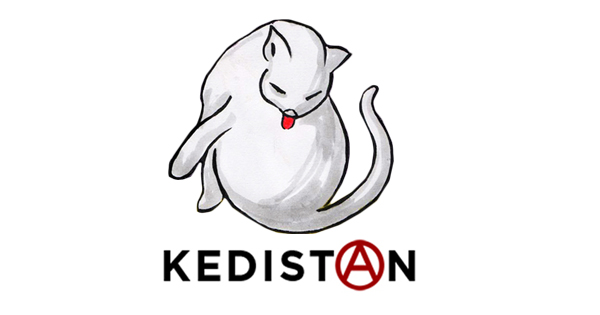Castellano | English | Français
Gülsüm Cengiz is one of the most celebrated Turkish poets. She wrote the following poem based on a true story.
We are in in the 1980s. Just as they are today, State prisons are crammed with political prisoners, then following on the September 12 1980 coup d’état… Torture is in full swing. Kurdish is a forbidden tongue. The visitors’ centers in prisons are covered in posters saying “Speak Turkish, speak a lot”. Non-Turkish speaking families, especially the older people, attempt to learn a few words in Turkish so as to communicate with their imprisoned relatives.
In the leaden year of 1983, Kamber, then in the military prison of Mamak in Ankara, received a letter from home. “Your mother has a final wish,” the letter said. “Ever since your imprisonment, she has been asking ‘please, take me to my son, I want to see him one last time before I die.’ So, we will bring her along on our next visit.”
Kamber waited, torn between the pleasure of seeing his mother, and the fear the visit would turn into a session of torture, a common occurrence at the time.
İpek Ateş finally came to see her son, after seven years of separation… She spoke to him, using the only Turkish words she had been able to learn : “Kamber Ateş, how are you?” Seven years of longing in that one sentence…
“Kamber Ateş, how are you?” asked the mother.
Kamber answered:
- “I’m fine, mother. How’s father, how’s the land?”
— “Kamber Ateş, how are you?”
— “Mother, how is your health? How was the trip?”
— “Kamber Ateş, how are you?”
- “How is my brother, how are the neighbours?”
— “Kamber Ateş, how are you?”
Back in his cell, his comrade asked how the meeting had gone. “So how did it go? What did you talk about?” Kamber answered: “About lots and lots of things.”
Kamber Ateş was put on trial by a junta tribunal calling for the death penalty. He was sentenced to perpetuity. He was liberated after 11 years in prison. Kamber’s story is one among so many. But those moving words “Kamber Ateş, how are you?” has become a cult reply, a symbol of those years of oppression. It became the title of a book on prisons, published by the Diyarbakir Human Rights Association (IHD). In 2007, Kamber’s story was made into a short film by the NHKM group, the video can be seen here, illustrated by Ender Özkahraman, from the satirical magazine Leman, and it inspired Gülsüm Cengiz her poem… Artist, author and journalist Zehra Doğan did not forget “Kamber Ateş, how are you?” either. In the graphic book to be published in 2021 by Editions Delcourt, a book she drew while in prison, she relates the story of the Diyarbakir gaol in drawings, providing an overview of the persecutions and resistance in Turkey. She also mentions this story.
Although this poem was written twenty years ago, given the situation in the country, it is still current. The poet dedicates it to all those who have been deprived of their tongue.
Kamber Ateş how are you?
My language is under arrest, son
I can’t speak to you
look into my eyes
you’ll see what I say.
And also this sentence
repeating itself on my lips
this emotion in my eyes
finding its expression
İn the tone of my voice.
-Kamber Ateş how are you?
My language is under arrest, son
I can’t speak to you
look into my eyes
you’ll see what I say.
There you’ll find
the yearning, the pain
and the love in my heart.
My son, I miss you.
-Kamber Ateş how are you?
My language is under arrest, son
I can’t speak to you
look into my eyes
you’ll see what I say.
In my eyes blooms
the joy of our meeting again
it blooms
and finds its way to your cell
and the odour of the thymes
the violets of the vineyards.
I brought for you
from the mountains, from home
and the socks I weaved for you.
My son, what would you like, you?
‑Kamber Ateş how are you?
My language is under arrest, son
I can’t speak to you
look into my eyes
you’ll see what I say.
In my eyes there is anxiety
left over from sleepless nights
from the news I heard.
Did they torture you?
-Kamber Ateş how are you?
My language is under arrest, son
I can’t speak to you
look into my eyes
you’ll see what I say.
In my eyes a scream
out of fury, out of resistance.
My advice to you son
do not lose your power to resist
keep your head high
don’t you surrender to oppression
don’t you!
-Kamber Ateş how are you?
My language is under arrest, son
I can’t speak to you
look into my eyes
when we say farewell.
In my eyes is sadness,
that bluest sky
the flowers in the fields
the mad winds of the mountains
the cool waters of the streams.
That love and freedom,
that you’re fighting for.
My beloved, beloved son, goodby to you.
-Kamber Ateş how are you?
Translation from Turkish: Suat Karantay
 Gülsüm Cengiz is one of the most acclaimed poets in Turkey. She wrote this poem during the 90s when Kurdish was a forbidden language in the prisons. In order to talk to her imprisoned son, a Kurdish woman learns one sentence in Turkish.
Gülsüm Cengiz is one of the most acclaimed poets in Turkey. She wrote this poem during the 90s when Kurdish was a forbidden language in the prisons. In order to talk to her imprisoned son, a Kurdish woman learns one sentence in Turkish.
Though this poem was written almost twenty years ago, it is still relevant for what is going on in the country. Gülsüm Cengiz dedicates it to everyone who has been denied their language.






